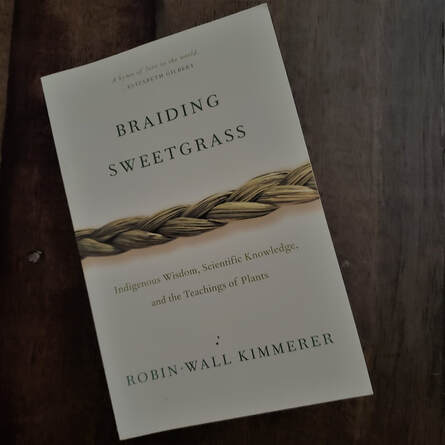After finishing the book, I was left with a great deal to ponder and examine. My parents garden but in my own adult life, I have never attempted to keep plants. To read and hear about all the knowledge within the cycle of chestnut trees, as one example Wall Kimmerer uses in her book, furthered my understanding. Her book showed how many natural cycles have been disrupted and knowledge lost. Humans have a hand in the disruption and the destruction. Humans will be needed for the solution.
|
I had a chance over the holidays to sit down with the wonderful book, Braiding Sweetgrass, by Robin Wall Kimmerer. The book weaves together Wall Kimmerer’s experiences and knowledge from the multiplicity of her identity in a way that takes the reader on a journey through scientific knowledge, history, and cultures. Wall Kimmerer showed how her approach to teaching changed as she grew more confident that the ways to reach her students also meant reframing the paradigm. She challenges the western approach to scientific knowledge, the patriarchy and the hierarchy of academia, and the view of nature as driven by their value as resources. She does the by demonstrating that humans are in a relationship with other entities; a plant, a rock, an ecosystem, have their own knowledge and abilities. The book frames ways to consider knowledge and viewpoints and encourages all readers to consider their relationship with land usage and how it is a fraught conversation.
After finishing the book, I was left with a great deal to ponder and examine. My parents garden but in my own adult life, I have never attempted to keep plants. To read and hear about all the knowledge within the cycle of chestnut trees, as one example Wall Kimmerer uses in her book, furthered my understanding. Her book showed how many natural cycles have been disrupted and knowledge lost. Humans have a hand in the disruption and the destruction. Humans will be needed for the solution.
0 Comments
|
Author(she/her/hers) Categories
All
Archives
October 2021
|

 RSS Feed
RSS Feed